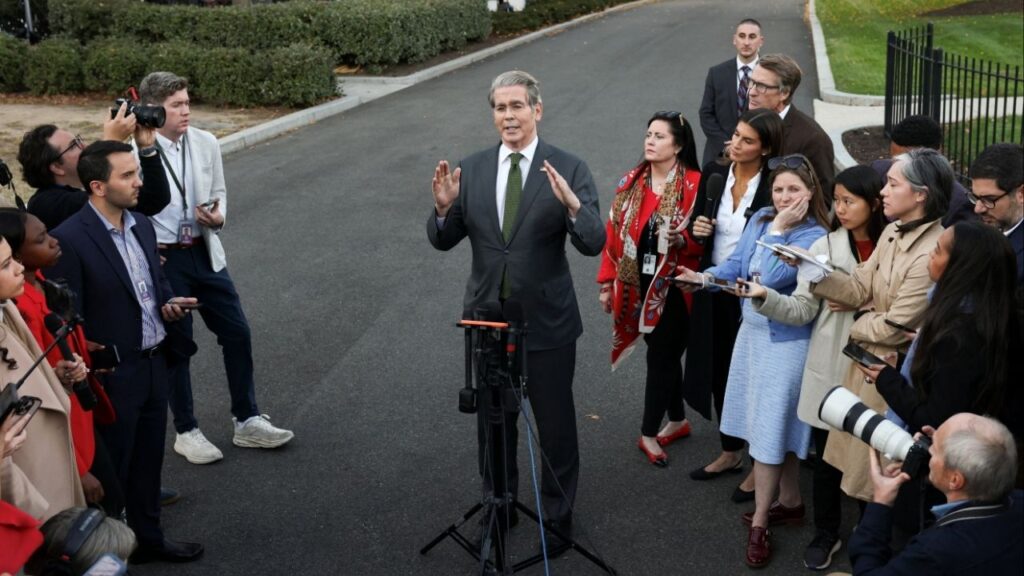Speaker of the House Mike Johnson, R-La., meets with reporters ahead of a Wednesday visit by Israeli Prime Minister Netanyahu who will address a joint meeting of Congress, at the Capitol in Washington, Tuesday, July 23, 2024. (AP/J. Scott Applewhite)

- Kamala Harris advocates for eliminating the filibuster to secure federal abortion rights, prompting varied reactions from lawmakers.
- The filibuster is not constitutional and evolved from an accidental Senate rule change, historically used primarily for obstruction.
- Critics argue that majority rule should prevail, allowing elected parties to implement their agendas without needing a supermajority.
Share
|
Getting your Trinity Audio player ready...
|

Jamelle Bouie
Opinion
If the filibuster did not exist, it is hard to believe that anyone would invent it.
As it stands, the Senate rule allowing unlimited debate is still in effect. But there are carve-outs — exceptions that allow the Senate to pass a bill or take action with a simple majority, as was true for nearly everything the chamber did through most of its 235-year history. Under reconciliation, an expedited process for budget bills, the Senate can pass anything related to revenue, spending or debt with 51 votes: no filibusters allowed. In 2013, Democrats under Harry Reid ended the filibuster for most executive branch and judicial nominations, and in 2017, Republicans under Mitch McConnell did the same for Supreme Court nominations.
Related Story: Former Congressman TJ Cox Wants a Trial. Will Feds Revoke Plea Offer?
On Monday, Vice President Kamala Harris told Wisconsin Public Radio that she wants another exception to the filibuster. “I’ve been very clear, I think we should eliminate the filibuster for Roe and get us to the point where 51 votes would be what we need to actually put back in law the protections for reproductive freedom and for the ability of every person and every woman to make decisions about their own body and not have their government tell them what to do,” said the former senator from California.
Harris is not the first Democrat to call for filibuster reform to secure federal abortion rights. Following the Supreme Court’s decision in Dobbs v. Jackson Women’s Health Organization, President Joe Biden told reporters that he believed “we have to codify Roe v. Wade into law, and the way to do that is to make sure that Congress votes to do that, and if the filibuster gets in the way, [there] should be an exception.”
“Shame on her,” said Joe Manchin of West Virginia, who will leave the Senate at the end of his term. “She knows the filibuster is the Holy Grail of democracy. It’s the only thing that keeps us talking and working together. If she gets rid of that, then this would be the House on steroids.”
Manchin is expressing the common view that the filibuster is somehow integral to the functioning of the Senate; that the chamber would lose its (apparent) reputation for camaraderie and deliberation if it were to jettison the tradition of unlimited debate; and that without unlimited debate, democracy succumbs to silence. Or something.
Related Story: Once in Congress, Cox Could Soon Learn His Fate in Court
The problem with this view is that it’s hard to reconcile with the actual history of the Senate. Remember, the filibuster is not in the Constitution. And it wasn’t created as a specific rule with a specific purpose. It is, instead, an accident — the inadvertent result of a seemingly minor revision of the Senate rule book at the start of the 19th century. The Senate would not see its first actual filibuster until 1837, when a group of Whig senators successfully filibustered a bill to expunge a resolution of censure against President Andrew Jackson. And we wouldn’t see Americans use the word “filibuster” — derived from a Dutch word associated with pirates and mercenaries — to mean legislative obstruction until the 1850s.
The filibuster was used sparingly through the rest of the century and into the next, most often deployed to kill or try to kill those items — a civil rights bill, election law reform and, in the 1920s, anti-lynching legislation — that threatened the social order of one peculiar section of the nation. Otherwise, the Senate did its business using simple majority rule. It followed, for the most part, the principle laid out by Sen. Henry Cabot Lodge of Massachusetts in an 1893 essay on obstruction. “The two great rights in our representative bodies are voting and debate,” he wrote. “If the courtesy of unlimited debate is granted it must carry with it the reciprocal courtesy of permitting a vote after due discussion.”
According to Manchin and other modern defenders of the filibuster, this should have been impossible. How can there be deliberation when there is majority rule? How could there be stability in government when all it takes is a majority in the Senate and a majority in the House to pass a bill and send it to the president’s desk?
The answer is in the question. You could even say it’s self-evident. Inherent to bicameralism, as the framers of the Constitution recognized when they rejected the unicameral Legislature of the Articles of Confederation, is an extra-majoritarian barrier to the exercise of legislative power. As James Madison observed, defending the Senate from its critics in Federalist No. 62, “[A] senate, as a second branch of the legislative assembly, distinct from, and dividing the power with, a first, must be in all cases a salutary check on the government. It doubles the security to the people, by requiring the concurrence of two distinct bodies in schemes of usurpation or perfidy, where the ambition or corruption of one, would otherwise be sufficient.”
Related Story: After Trump Assassination Attempts, Congress Debates Secret Service Funding
Simply dividing the legislative power between two chambers is a check on untrammeled majoritarianism. And with its small size and long terms of office, the structure and composition of the Senate facilitate a culture of deliberation. To be free from “the impulse of sudden and violent passions,” wrote Madison, a legislative body must be “less numerous,” “possess great firmness” and “hold its authority by a tenure of considerable duration.”
To this, you can also note that equal state representation — each state receives two senators regardless of population — erects another countermajoritarian obstacle to those who want Congress to act. Senators representing a minority of the entire population can defeat, with a simple majority, senators representing a majority of the population.
Put a little differently, a party needs to do more than win a single election cycle to pass a piece of legislation. Consider the 2017 Tax Cuts and Jobs Act. Republicans had to first win a Senate majority in 2014 and then hold that majority in 2016. They had to simultaneously hold their House majority. And they had to, of course, win the White House.
Once in power, Republicans had to build and negotiate a package. The final bill was, at the time of passage, deeply unpopular, and it is not difficult to imagine a situation in which it might have failed to reach a majority in either the House or Senate.
Manchin and other defenders of the filibuster would have you believe that this process is too easy, that it is too fast, that it doesn’t allot enough time to public discussion or legislative deliberation.
But that’s absurd.
If a political party wins multiple and overlapping electoral majorities on its platform, if it manages to build an actual legislative package, if it can move that package through two chambers of Congress — which is to say, multiple committees that at any point could exercise their own veto — then that party deserves a chance to vote on its program without needing to assemble a supermajority just to act.
And if the voters don’t like it, they can vote them out. That is democracy.
–
This article originally appeared in The New York Times.
c. 2024 The New York Times Company
RELATED TOPICS:
Categories

Argentina and US Sign Sweeping Trade Deal as Alliance Deepens

Fresno Teen Killed in Pedestrian Crash on Highway 99 Identified

White House Deletes Racist Trump Post Depicting Obamas as Apes
















